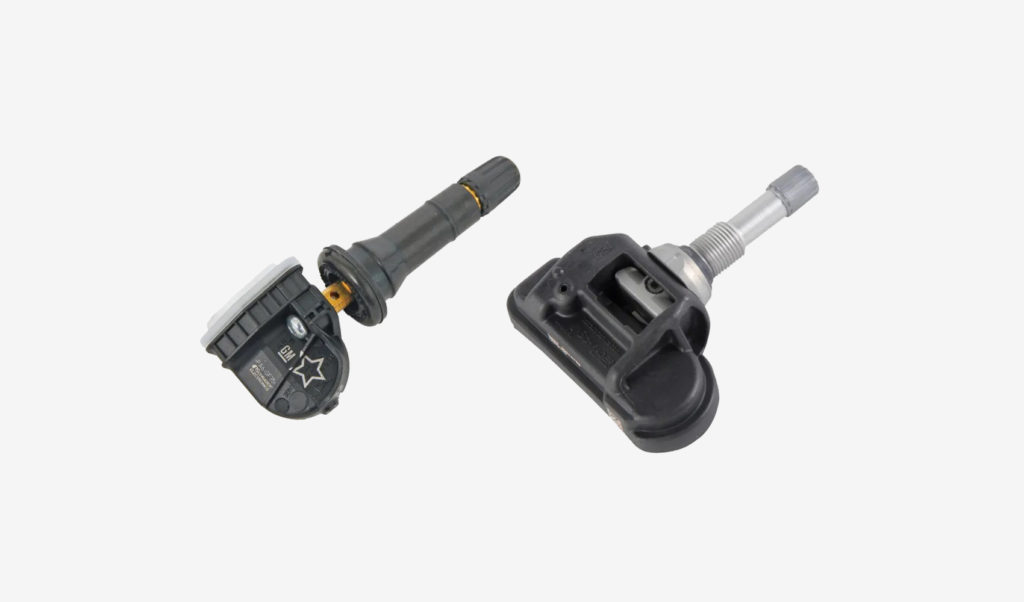Your vehicle has many sensors that monitor various systems and alert you of certain issues by displaying warning messages or activating a warning light on the dashboard. Among them are tire sensors. And while their function is pretty straightforward, they actually serve other important roles that are crucial to the overall operation of your vehicle.
What Is a Tire Pressure Sensor?
A tire pressure sensor is an electronic device that measures the air pressure inside the tire. You’ll typically find this sensor inside the pressurized pocket made by the wheel and tire.
How Do Tire Pressure Sensors Work?

The tire pressure sensor uses a low-frequency radio to transmit signals to a control module. Once the module detects that one or more tires are low on air (less than 25% of the recommended air pressure), it will activate the appropriate TPMS warning light on the vehicle’s dashboard.
Tire Pressure Monitoring System
The tire pressure sensors are an integral part of the tire pressure monitoring system (TPMS) that was made mandatory in all vehicles in 2008. Each sensor is usually attached to the valve stem assembly of each tire.
Prior to the mandate, early-model vehicles used an indirect system that relied on wheel speed sensors. The sensors are responsible for detecting changes in inflation pressure, which is calculated by comparing the rolling radius of diagonal tires.
The values calculated based on the information given by the wheel speed sensors are then compared to the threshold value that will determine whether or not the control module will activate a warning light.
What Happens When Your Tire Sensors Go Out?

A defective tire sensor won’t necessarily affect your vehicle’s drivability, but you’ll lose real-time information about your tire’s air pressure. So you won’t be able to tell when it’s time to add air or change the tire unless you see that it’s deflated.
Moreover, driving with underinflated tires also affects the steering and brake systems, increasing the risk of road accidents.
Signs You Need to Replace Your Tire Pressure Sensor
Common signs it’s time to replace your vehicle’s tire pressure sensor include warning lights that don’t light up when they should, increased fuel consumption, and poor handling.
Malfunctioning Warning Lights
If your tire pressure warning lights fail to light up when they should, there’s a good chance there’s something wrong with the sensors. The best way to address this problem is to manually check the tire pressure and see if they’ve fallen outside of optimal parameters. If so, and the warning lights aren’t activated, your sensor might be damaged.
Increased Fuel Consumption
When tire pressure sensors fail, it gets difficult to determine whether or not your tires have the appropriate levels of air pressure. If you don’t check the pressure manually, you might wind up driving with a flat tire. If this happens, it’ll take a lot more power and fuel to get your vehicle moving. As a result, fuel consumption increases.
Poor Handling
Another sign you need to replace your vehicle’s tire pressure sensor is if you’re having a harder time controlling your car when you drive but the warning light isn’t activated.
If your steering feels tighter, if the driving feels clunky, or if your handling doesn’t feel right, there’s a good chance there’s a tire pressure issue that your sensors aren’t picking up on.
If this happens, check the air pressure of your tires to see if they’re over or underinflated.
How Much Are Tire Sensors?
Depending on the brand and your vehicle’s specifications, a tire sensor replacement will generally cost anywhere between $25 and $200. Labor costs for this type of repair usually range from $55 to $200.
Tire Inspection
Although your vehicle has several sensors that can tell you whenever something’s wrong, it’s still important to conduct periodic visual inspections on your vehicle to check for obvious signs of trouble.
Without a functional tire pressure sensor, you’ll need to be keen on checking your tires. A visual tire inspection can give you clues about steering or suspension problems. Check your tires for the following to know when it’s time to get a replacement or visit an auto care shop.
- Tread depth (2/32)
- Unequal wear
- Cuts in the tread or sidewall
- Bulges or uneven sidewalls
How to Check Your Vehicle’s Tire Pressure
Checking tire pressure on your own is a relatively easy task that can save you time and resources.
Start by using a good-quality tire pressure gauge. Push it against the tire’s valve stem once the cap is removed. Make sure that no air escapes from the tire while mounting the pressure gauge to avoid getting inaccurate readings.
Once you have the pressure reading from the gauge, compare its results with the specified pressure readings on the placard that’s attached to the driver’s door.
Featured TPMS Sensors

Top-notch tire pressure monitor sensors are as important as any other car part. Here are some of the best brands for your next purchase.
Dorman
TPMS sensors from Dorman come as a direct-fit replacement for various makes and models.
Standard
Standard’s replacement TPMS sensors undergo systematic inspection to guarantee enduring performance and quality. They are also designed to meet OE specifications and cover a broad range of imported and domestic models.
Denso
TPMS sensors from Denso are compatible with various makes and models. Innovatively engineered using state-of-the-art materials, these sensors guarantee superior, long-lasting performance.

Motorcraft
Motorcraft is Ford’s official manufacturing arm and produces a wide selection of precision-engineered TPMS sensors.
AC Delco
AC Delco’s TPMS sensors feature a high-grade design that guarantees long-lasting performance. Engineered according to OE specifications, these sensors also come with a low-price guarantee and have undergone strict testing procedures.
Crown
Crown TPMS sensors come as a direct-fit replacement for various Jeep models. They Follow strict OE specifications for easy installation.
Any information provided on this Website is for informational purposes only and is not intended to replace consultation with a professional mechanic. The accuracy and timeliness of the information may change from the time of publication.




























